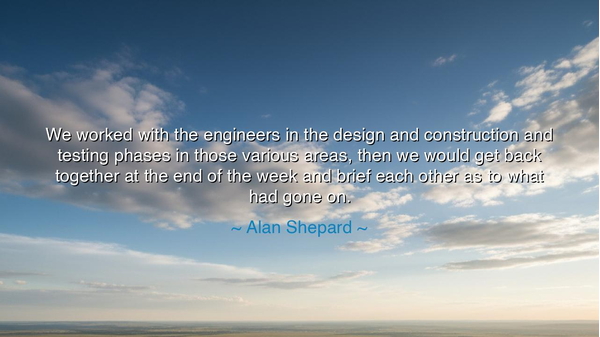
We worked with the engineers in the design and construction and
We worked with the engineers in the design and construction and testing phases in those various areas, then we would get back together at the end of the week and brief each other as to what had gone on.






In the great saga of human exploration, when courage and intellect joined hands to pierce the heavens, Alan Shepard, the first American to journey into space, spoke words that reflect the very essence of collaboration and disciplined progress: “We worked with the engineers in the design and construction and testing phases in those various areas, then we would get back together at the end of the week and brief each other as to what had gone on.” Though spoken in the measured tone of an astronaut recalling his work, these words are not merely technical—they are sacred testimony to the spirit of unity, communication, and perseverance that make all great endeavors possible. Within this quiet recollection lies the philosophy of how humanity builds its future: step by step, hand in hand, truth shared among many hearts.
Shepard’s quote comes from the age of the Space Race, a time when men and women of science stood on the precipice of the unknown. America was reaching toward the stars, not merely to conquer distance, but to prove that human ingenuity could defy limitation. The astronauts, though celebrated as heroes, knew they did not stand alone. Behind every flight stood thousands of minds — engineers, designers, builders, and dreamers — each working tirelessly in their domain, testing, failing, and trying again. When Shepard spoke of gathering at the week’s end to “brief each other,” he described more than a meeting; he described the ritual of progress, where knowledge is pooled, errors are confessed, and victories are shared.
The ancients, too, understood this rhythm of cooperation. In the building of the Great Pyramids, the laborers, architects, and priests worked not in isolation but in harmony, guided by a shared vision that reached toward eternity. The stones were heavy, the labor endless, but their unity forged monuments that still touch the sky. In Shepard’s world, the stones were replaced by circuits, steel, and equations, yet the principle remained the same: no great thing is built by one alone. Teamwork is the chisel that shapes dreams into reality, and communication is the hand that steadies it.
It is easy to imagine Shepard and his companions — the astronauts of Mercury and Apollo — returning from long days of training and testing, gathering around tables strewn with blueprints and flight data, recounting the week’s trials. Each voice, though different in tone and specialty, formed part of a single symphony. One spoke of design flaws, another of engineering challenges, another of the human body’s reaction to weightlessness. And by sharing what they had learned, they made each other wiser. It was not glory they sought in these meetings, but understanding — the kind that could save lives and turn chaos into order. This is the quiet heroism of collaboration, the unseen foundation beneath every act of greatness.
The story of Shepard’s quote reminds us that knowledge grows not in isolation, but in exchange. When the individual hoards what he knows, the flame flickers and dies. But when many share their insights — when the scientist, the craftsman, and the dreamer sit together — their combined light can outshine the stars. So it was in the space program, and so it has been in every chapter of progress. The Wright brothers debated endlessly over wing design before taking flight. The thinkers of the Renaissance — Leonardo, Galileo, Brunelleschi — learned by exchanging ideas, refining one another’s visions. Greatness, then, is not born from solitude alone; it is forged in dialogue.
Yet there is another layer of wisdom in Shepard’s words: the discipline of reflection. “At the end of the week,” he says, “we would get back together.” In this rhythm of work and review lies the secret of mastery. Every effort, however great or small, must be examined, understood, and shared. This is the balance between action and contemplation — to labor with all one’s strength, and then to pause, look back, and learn. The ancients called this praxis: the cycle of doing, reflecting, and improving. The modern world often forgets this. We rush forward, driven by noise and speed, without stopping to ask, “What have we learned?” But Shepard’s practice teaches that reflection is not delay — it is wisdom in motion.
Therefore, O seeker of progress, take this lesson to heart: whether you build machines or dreams, whether you lead nations or nurture families, remember that success is born of cooperation, reflection, and shared purpose. Speak with those who labor beside you. Learn from their failures, share your triumphs, and never let pride silence communication. For a team divided by ego cannot reach the stars. Like Shepard and his companions, gather often to share what you have discovered, and the work of many will rise higher than the work of one.
In the end, Alan Shepard’s quiet recollection becomes a timeless teaching: progress is the child of patience and unity. Every triumph of humanity — from the pyramids to the moon — has been built by hands that worked together and minds that dared to speak. Let this wisdom guide you: work earnestly through the week, but never forget to gather at its close — to reflect, to share, and to remember that the heavens are reached not by one man’s strength, but by the harmony of many souls moving as one.






AAdministratorAdministrator
Welcome, honored guests. Please leave a comment, we will respond soon